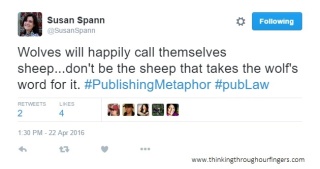We are happy to welcome Emily R. King as our newest contributor – that’s two this week!
So you want to get your book published. You have a polished manuscript ready to go, now what? You can query literary agents, submit to small presses, or consider self-publishing. There is no wrong path, so long as it’s right for you. But no matter which course you take, be on watch for predators.
Years ago, when I was green to the industry, I visited a highly regarded website to research small presses, assuming they, too, were reputable. I submitted my manuscript to two presses, but sadly, after they both offered me publication, I discovered they were vanity presses.
A vanity press is often a print-on-demand publisher that will nickel and dime a writer for costs before publishing their book. With more and more small presses popping up, how does a writer distinguish a good press from a bad one?
Author and publishing attorney Susan Spann posts regular tips on Twitter (#PubLaw). Susan recently tweeted about how vital it is for writers to investigate traditional publishing houses before they sign a contract. Susan gave me permission to share her insights:
- Beware of offers or contracts that require the author to pay out of pocket for anything
- Beware of publishers that offer (or require) authors to pay for “training” or “marketing plans”
- Beware of any publisher that makes claims about the success or profitability of your work
- Beware of any press that requires authors to purchase a stated number of copies of the finished book
- Find out how long the press has been in business
- Find out how much traditional publishing experience the editors, marketing VP, and publisher have
- Find out what other authors and industry watchdogs have to say about the press
- Find the publisher’s other books (in a store or online) and hold/read/examine them
Susan goes on to state that the most important thing when evaluating publishers is to trust your instincts. If anything seems off, don’t sign.
I can attest to this advice. My elation after receiving consecutive offers was quickly doused by the poor reputation of the small presses. I’m so grateful for Writer Beware, which lists predatory small presses, agents, and freelance editors. This free resource for writers saved me from signing a terrible contract.
In the end, we all want our books to be published, but we can’t let our high hopes interfere with responsible research and heeding our intuition. Be on guard for any business practice that feels predatory. No writer wants to fall for a wolf in sheep’s clothing.
___________________
Emily R. King is a reader of everything and a writer of fantasy. Born in Canada and raised in the U.S., she’s perfected the use of eh and y’all and uses both interchangeably. Shark advocate, consumer of gummy bears, and an islander at heart, Emily’s greatest interests are her four children. She’s a member of SCBWI and represented by Marlene Stringer of Stringer Literary. You can find this happy feminist in pink shoes yammering away at getbusywriting.blogspot.com and @erittelking on Twitter.



Great post, Emily – and thank you for the shout-out to me and to #PubLaw. So many authors are thrilled to receive offers, but not confident enough to ensure that their work receives the fair contract treatment it deserves. Hopefully this will help other authors realize that no matter where you are in a publishing career, you deserve a fair contract!
LikeLike
Awesome. It so easy for newbies to get sucked into a bad deal, eh?
LikeLike
Great cautionary post. Eeek. Yes, being published isn't worth it if we run right into the jaws of that sheep-clothed wolf. 😛
LikeLike
Great advice, learned from hard experience. Great post, Emily!
LikeLike
It's too bad there are so many wolves in sheep's clothing.
LikeLike
Thanks for allowing me to use your knowledge, Susan!
LikeLike
Totally. It was super close for me!
LikeLike
Very true, Carol!
LikeLike
Thanks, Mark!
LikeLike
Is really is, isn't it?
LikeLike